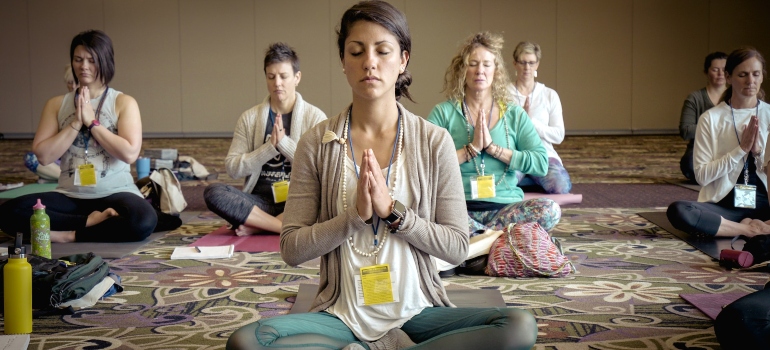What if a single thought could help steer the course of addiction recovery? This isn’t a philosophical query but a reality many have experienced. Harnessing the power of positive thinking in addiction recovery, as countless individuals have done, can be transformative. Let’s find out how!
The Role of Positive Thinking in Addiction Recovery
Have you ever stopped to consider the transformative power of positive thinking in addiction recovery? It may seem abstract, but the mindset with which we approach our life’s battles significantly influences their outcome.

In the context of addiction recovery, a challenge that can push an individual to their mental and physical limits, positive thinking emerges as a potent tool for change. Remember – as much as experts from addiction therapy can help, the hard work has to be done by you! So let’s learn how to adjust your mindset and make your recovery journey easier.
The Essence and Significance of Positive Thinking in Addiction Recovery
The power of positive thinking in addiction recovery is more than just a comforting concept—it’s a critical element that fuels the transformative process from addiction toward a healthier life. The influence of a positive mindset is manifold, permeating every aspect of recovery:
- Behavioral Influence: Positive thinking initiates the spark for change, prompting healthier decisions and actions. It breeds resilience, allowing individuals to navigate the road to recovery with a sense of determination and perseverance.
- Mind-Body Connection: The synergy between mind and body is significantly affected by our thoughts. A positive outlook can lead to improved physical health, boosting the body’s resilience against the physiological impacts of addiction.
- Scientific Evidence: Various studies and real-life testimonials substantiate the benefits of positive thinking in addiction recovery. From testimonies of those who overcame their addiction in cocaine rehab to those who found renewed hope during a benzo detox, the stories are endless.
- Positive Thinking in Practice: Practical examples abound, from the sober houses in diverse locations to the therapy rooms of alcohol rehab centers. Everywhere, the power of positive thinking finds expression, driving recovery and shaping new lives.
Having in mind that addiction is a serious illness that can affect all facets of a person’s life, positive thinking is, thus, not merely a beacon but a potent catalyst fostering recovery, instilling a sense of hope, and guiding individuals toward a substance-free life. It’s the quiet strength that empowers individuals to rewrite their stories, turning the page from addiction to a promising, healthier future.
Challenging Negative Thoughts and Cultivating Positive Thinking in Addiction Recovery
Recovery from addiction is not a straight path. It can be laden with obstacles, from physical withdrawal symptoms to psychological battles. Among these, the psychological challenge of negative thought patterns is one of the most formidable.

These self-destructive thoughts can be a significant hindrance in the recovery process, often fuelling the cycle of addiction. However, the power of positive thinking can help you rewrite these negative patterns, and here’s how.
Combatting Negativity with Cognitive Behavioral Therapy
A holistic therapy for addiction, which usually includes Cognitive Behavioral Therapy (CBT), can be remarkably effective in challenging these negative thoughts. CBT equips individuals to understand and alter thought patterns leading to harmful behaviors and feelings. It can be an integral part of addiction therapy, helping those in recovery recognize these destructive thoughts, comprehend their impact, and develop practical strategies for transformation.
Art Therapy: Painting the Canvas of Positivity
Whether it’s through painting, sculpting, drawing, or even collage-making, art therapy allows individuals to explore their emotions and experiences in a safe, non-judgmental space. Art therapy in addiction recovery is a unique pathway to self-expression, helping individuals articulate feelings that may be difficult to put into words. The creative process often facilitates a deeper understanding of oneself, fostering personal growth and a positive mindset.
Music Therapy: Harmonizing the Mind
Music therapy, often overlooked, is an incredibly potent tool for fostering positive thinking during recovery. This approach uses music—listening, creating, or even dancing—to improve mental and emotional health. The soothing power of music can alleviate stress, enhance mood, and stimulate positive interactions. Moreover, creating music can serve as a productive outlet for expressing emotions, making it a highly beneficial tool in the recovery journey.
Nature Therapy: The Healing Power of the Outdoors
The natural world holds tremendous healing potential. Spending time in nature, often referred to as ‘forest bathing’ or ‘nature therapy,’ has been shown to reduce stress, anxiety, and negative emotions. The calming influence of nature, whether it’s a walk through a lush forest or sitting by a tranquil stream, can stimulate positive thoughts and feelings. This peaceful interaction with nature can serve as a strong foundation for building a positive mindset during recovery.

Physical Activity: A Bridge to Mental Wellbeing
Physical exercise is not just about building muscles or enhancing stamina; it’s also a mighty booster for mental health. Regular physical activity has been found to reduce symptoms of anxiety and depression, disorders often accompanying addiction. By triggering the release of endorphins – the body’s natural mood lifters – exercise fosters a positive outlook.
Balanced Diet: Nurturing Your Body
A balanced diet can be an underrated ally on the road to recovery. Nutrient-rich foods not only contribute to physical health but also improve mood and energy levels. For instance, during a cocaine addiction rehab, good nutrition can support the body during the healing process. It aids in repairing physical damages caused by substance abuse, thus making it much easier to nurture a positive mindset.
Engaging in Hobbies: Activities That Bring Joy
Hobbies offer a valuable diversion from the strains of recovery, promoting positive thinking in addiction recovery. Whether it’s painting, reading, gardening, or playing an instrument, hobbies provide a creative outlet for emotions. They instill a sense of accomplishment and purpose, serving as an affirmation of personal capabilities and enhancing positivity during the recovery journey.
Building Self-esteem and Self-worth through Positive Thinking
Positive thinking isn’t just a tool for combating negativity; it’s a catalyst for cultivating self-esteem and self-worth—an essential aspect of the journey toward sobriety. The impact of positive thinking on one’s perception of self-worth is truly profound. By emphasizing personal strengths and downplaying perceived faults, positive thinking fosters a healthier self-image.
It’s crucial, especially in an environment like a benzo detox center, where the physical and mental struggles can sometimes dampen one’s sense of self-worth. A positive mindset reminds the individual of their strength, resilience, and worthiness of recovery and a healthier, sober life.
The transformative power of positivity in building self-esteem isn’t just theoretical; it’s been seen in action. Many individuals, who walked into alcohol rehab centers near Cambridge OH or near Athens OH burdened with low self-esteem, found their perceptions of themselves dramatically improved as they adopted a positive mindset. This mindset remains crucial today, helping those individuals stay true to their sober lifestyles.
Harnessing Positive Thinking for Motivation and Goal Setting
The role of positivity in maintaining motivation during recovery cannot be overstated. The journey from addiction to sobriety is challenging, and it’s easy to lose sight of the destination when the road gets tough. This is where positive thinking plays a crucial role.

A positive mindset aids in setting realistic goals, maintaining a determined focus, and visualizing success. It helps to establish achievable targets, such as maintaining sobriety for a week, a month, or a year. Visualizing oneself achieving these goals can be a powerful motivator. For example, consider the environment of a fentanyl detox treatment center. The withdrawal symptoms can be extremely challenging. However, by picturing success and maintaining a positive outlook, individuals can strive towards their goal of detoxification and subsequent recovery.
The power of positive thinking in addiction recovery also shines when setting goals for life beyond recovery. Perhaps you envision rebuilding relationships, pursuing a passion, or advancing your career. Maintaining a positive outlook helps keep these visions vibrant and within reach.
Navigating Challenges and Setbacks through the Lens of Positivity
Positive thinking can be a beacon in the dark when one is navigating the challenges and setbacks common in addiction recovery. Challenges can range from cravings and triggers to unexpected life stressors. Positive thinking aids in viewing these not as impenetrable barriers but as opportunities for growth and learning.
Even in the face of setbacks, a positive mindset encourages individuals to get back on the recovery path rather than spiraling into a cycle of self-blame. This is especially important in addiction recovery, where relapse is not an uncommon occurrence.
Gratitude, Mindfulness, and Their Role in Recovery
Gratitude and mindfulness – two concepts that, when practiced consistently, can significantly complement positive thinking in addiction recovery. Mindfulness involves living in the present moment and acknowledging feelings and experiences without judgment. On the other hand, gratitude is the act of recognizing and appreciating the good things in life.
Both mindfulness and gratitude can serve as potent tools to stay grounded during recovery. They can make individuals less reactive to stress and cravings and more appreciative of their progress, however small it may be. Practicing these concepts can be as simple as spending a few minutes each day in reflection or maintaining a gratitude journal. In the often stressful environment of an alcohol rehab center near Athens OH, these practices can bring a sense of peace and perspective.
Mindfulness and Meditation: The Art of Present-Moment Awareness
In the tumultuous seas of recovery, mindfulness and meditation act as an anchor. These techniques bring the mind’s focus back to the present moment, silencing the chaos of past regrets and future anxieties. Meditation, in particular, cultivates a sense of tranquility, offering a sanctuary for those navigating the stressful path of recovery. The practice of mindfulness promotes a non-judgmental acceptance of one’s feelings and experiences, fostering a positive outlook.

The Power of Pen: Journaling and Gratitude Lists
Writing can be a healing process, a silent confidante accepting thoughts and feelings without judgment. Journaling provides an outlet for emotions, promoting clarity and awareness. Furthermore, maintaining a gratitude list serves as a daily reminder of life’s blessings, nudging the mind towards positivity. By focusing on the silver linings, even in the face of adversity, one learns to view life through a lens of optimism and thankfulness.
Building a Positive Support System
One of the essential components of a successful recovery is a positive and supportive network. Surrounding oneself with positive influences can make the road to recovery less lonely and more manageable. This support can come in various forms, such as family, friends, support groups, or even professional counselors at an alcohol rehab center near Cambridge OH.
A positive network provides emotional support, motivation, and accountability—all crucial for maintaining sobriety. They cheer you on during your victories, offer a shoulder during your challenging times, and stand by you as you transform your life.
Affirmations and Visualization: Reinforcing Positive Thinking During Addiction Recovery
Positive affirmations and visualization are powerful techniques to reinforce positive thinking and make it a part of daily life. These techniques not only help combat negative thoughts but also boost self-esteem, providing the mental strength required in addiction recovery.
Positive affirmations are personal, positive statements that one repeats to oneself, affirming their worth and their ability to overcome addiction. On the other hand, visualization involves creating a mental image of one’s goals, fostering motivation, and making the goals seem more achievable.

Examples of affirmations and visualization exercises suitable for addiction recovery could include:
- Affirmations: “I am stronger than my addiction,” “I am deserving of a sober, fulfilling life,” “Every step, no matter how small, brings me closer to recovery.”
- Visualization: Visualizing oneself living a sober life, achieving set goals, and handling stressful situations without turning to substances.
Give it a try, and you’ll instantly feel a surge of confidence and motivation to succeed in your sobriety journey!
Embrace the Power of Positive Thinking in Addiction Recovery
Positive thinking in addiction recovery is your beacon, guiding you through the challenges toward a future defined not by addiction but by resilience and self-worth. Whether your journey commences at detox centers in WV or elsewhere, professional support, such as the one our team here at Harmony Ridge Recovery Center provides, can supply the strategies and strength to navigate this life-changing path. So remember – you’re not alone in your recovery journey.
Positive thinking reinforces your belief in overcoming hurdles, fostering a vision of a sober, fulfilling life, and progressively actualizing it. It’s about resilience, the daily commitment to move one step forward, no matter how small that step might be. Your journey is not merely about surviving; it’s about thriving—rebuilding a life of purpose and satisfaction. So, embrace positive thinking, an indispensable ally on your path to recovery, and let it guide you toward a brighter, healthier tomorrow.



